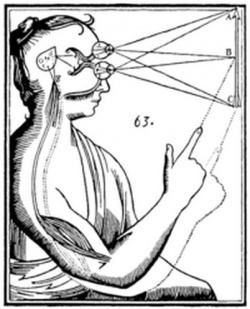Manas (early Buddhism)
Manas (Pali) The name of the seventh consciousness of the eight consciousnesses refers to the faculty of thought, the intellectual function of consciousness.is one of three overlapping terms used in the nikayas to refer to the mind, the others being citta and viññāṇa. Each is sometimes used in the generic and non-technical sense of "mind" in general, and the three are sometimes used in sequence to refer to one’s mental processes as a whole. Their primary uses are, however, distinct. The name of the seventh of the eight consciousnesses. I refers to the faculty of thought, the intellectual function of consciousness
Manas often indicates the general thinking faculty. Thinking is closely associated with volitions, because mental activity is one of the ways that volitions manifest themselves: "Having willed, one acts through body, speech, and thoughts." Furthermore, willing is described in terms of deliberate thinking.
Undeliberate thought is often an expression of latent tendencies (anusaya), which are conditioned by the volitional nexus of the past.
The term is not used in the description of the cognitive process in the early texts, aside from the preliminary role of manodhātu. The discursive activities of the cognitive process are rather the function of saññā, together with "reasoning" and "making manifold". This suggests that the "thinking" done by manas is more closely linked to volition than to the discursive processes associated with apperception. Manas is mainly the mental activity which follows from volitions, whether immediately, or separated by time and caused by the activation of a latent tendency.
